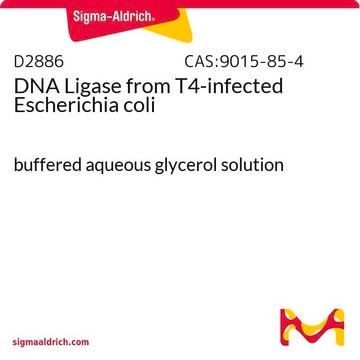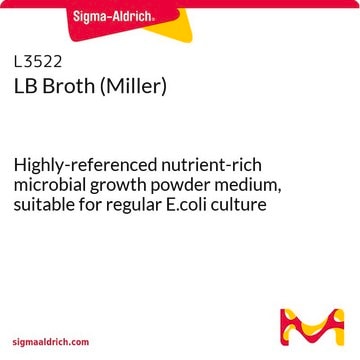DNALIG-RO
Roche
T4 DNA Ligase
solution, from Escherichia coli(NM 989), suitable for activity assay
Synonym(s):
dna ligase, t4
About This Item
Recommended Products
biological source
Escherichia coli (NM 989)
Quality Level
recombinant
expressed in E. coli
description
recombinant form of the enzyme from T4 phage
form
solution
specific activity
~3000 units/mg protein
packaging
pkg of 100 U (10481220001 [1 U/μl])
pkg of 500 U (10716359001 [1 U/μl])
pkg of 500 U (10799009001 [5 U/μl])
manufacturer/tradename
Roche
parameter
4-22 °C optimum reaction temp.
technique(s)
activity assay: suitable
optimum pH
7.2-7.8
storage temp.
−20°C
Related Categories
General description
Contents
T4 DNA Ligase, supplied with 10x concentrated ligation buffer that includes ATP.
Specificity
Application
Quality
Tested for the absence of deoxyribonucleases and exonucleases, according to the current Quality Control procedures.
Unit Definition
Volume Activity: 1 x 103 U/ml; 5 x 103 U/ml
Preparation Note
Working solution: For dilution of the enzyme Roche recommends using a buffer containing the components of the storage buffer: 20 mM Tris-HCl, 60 mM KCl, 1 mM EDTA, 5 mM dithoerythritol, 50% glycerol (v/v), pH 7.5 (4 °C).
Other Notes
Storage Class Code
12 - Non Combustible Liquids
WGK
WGK 1
Flash Point(F)
does not flash
Flash Point(C)
does not flash
Certificates of Analysis (COA)
Search for Certificates of Analysis (COA) by entering the products Lot/Batch Number. Lot and Batch Numbers can be found on a product’s label following the words ‘Lot’ or ‘Batch’.
Already Own This Product?
Find documentation for the products that you have recently purchased in the Document Library.
Our team of scientists has experience in all areas of research including Life Science, Material Science, Chemical Synthesis, Chromatography, Analytical and many others.
Contact Technical Service








